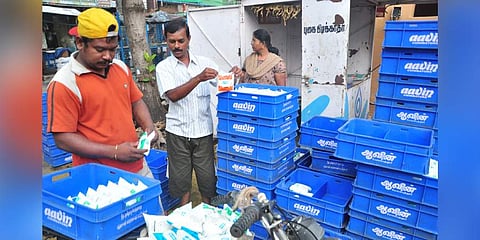

CHENNAI: With milk powder stock reaching 16,000 metric tonnes, the State-owned Aavin is set to launch bulk milk sale in the next few days to reduce the piling up of milk powder. Aavin’s stock of milk powder, which stood at 8,500 tonnes in July last year, increased to 16,000 tonnes in September allegedly resulting in loss of Rs 30 lakh a day.
This pile up of skimmed milk powder has been attributed to poor demand at national and international markets. Aavin’s attempts to sell the skimmed milk powder in bulk failed as buyers allegedly offered Rs 202 to Rs 205 per kg, while production cost of milk powder is Rs 251 per kg, said official sources. The selling price is Rs 320 per kg.
According to KS Kandasamy, Managing Director of Aavin, 39.55 lakh litres of milk are procured per day, of which 26 to 27 lakhs are sold in the commercial market at subsidised price and the rest is converted into milk products such as milk powder and ghee. “We will launch bulk milk sale to cut conversion of milk into powder in the next few days. We have decided to sell up to five lakh litres of milk and the plan is to increase it to nine lakh. Buyers will not be allowed to resell the milk, but can use it for making milk products,” said Kandasamy.
The per litre price of milk will be Rs 3 higher than the rate sold for consumers, he added. The price of per kg milk powder was Rs 320 in January 2019, but fell to `240 in September last year due to Covid lockdown. The price further fell to Rs 220 in the national market as total stock of milk powder by State-owned milk brands Amul, Nandhini, Aavin and Saras exceeded four lakhs tonnes.
Kandasamy claimed excessive stocking of skimmed milk powder has not translated into financial loss for the cooperative federation. “The milk powder has been divided into three categories depending on shelf life. The stock which is nearing its expiry period is being used during the standardisation process of milk at diaries and this way, eight tonnes of powder is consumed per day. The rest is being planned for sales between November and February — when demand for dairy products reaches its peak.”